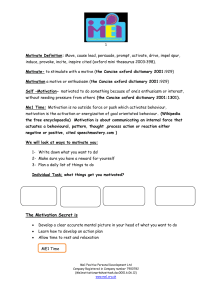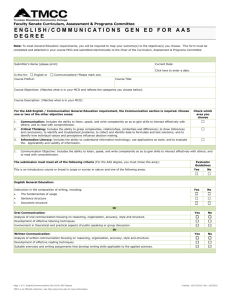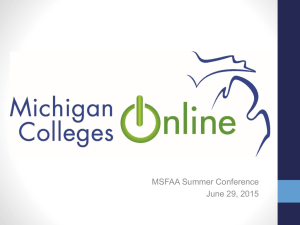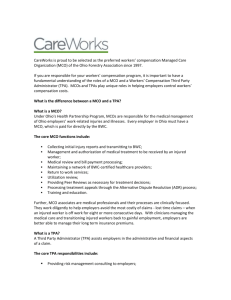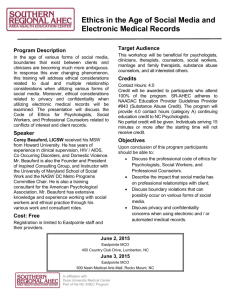Cleveland Community College NCMCO
advertisement
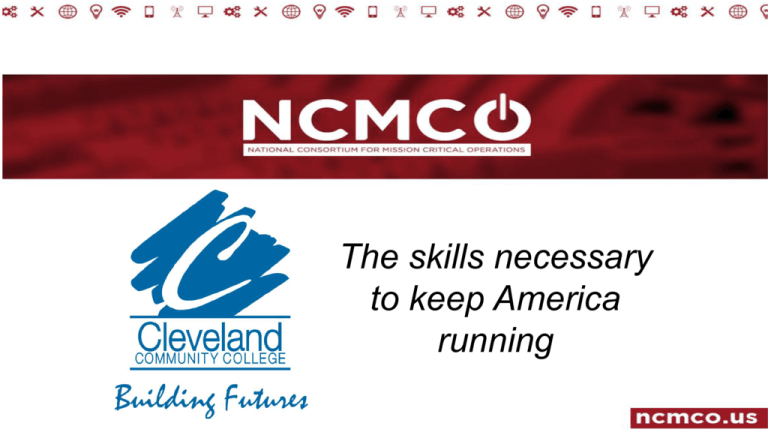
The skills necessary to keep America running United States Department of Labor TAACCCT Grant • $23.2 Million • Awarded in 2013 • Develop a training program and workforce for Mission Critical Operations (MCO) • 3 Years to complete What are Mission Critical Operations? “any operation requiring round-the-clock supervision of systems and is aimed at combating the evolving threat of critical infrastructure operations failure.” Where are Mission Critical Operations? • Technology is converging into every aspect of our lives • Much of this technology we depend on daily and take for granted • Any of that ubiquitous technology we can’t live without… • Electricity • Water • Transportation • Communication Systems (i.e. Phones, Internet) • … that’s where MCO ‘lives’ • Data Centers • Hospitals • Labs • Financial Institutions • Communications Companies • Emergency/911 Call Centers • Hundreds of other special facilities • HVAC • Power • Security • Controls • Location • Workforce • Communications Industry Partnerships Organization Partners What governmental agencies have MCO on their mind? • Here’s a few… US DHS? Really? Yes. Really. Critical Infrastructure http://www.dhs.gov/critical-infrastructure Presidential Policy Directive 21 (PPD-21): Critical Infrastructure Security and Resilience advances a national policy to strengthen and maintain secure, functioning, and resilient critical infrastructure. Critical Infrastructure Sectors • • • • • • • • • Chemical Commercial Facilities Communications Critical Manufacturing Dams Defense Industrial Base Emergency Services Energy Financial Services • • • • • • • Food and Agriculture Government Facilities Healthcare and Public Health Information Technology Nuclear Transportation Systems Water and Wastewater Systems For more information, visit http://www.dhs.gov/critical-infrastructure-sectors Mission Critical Operations Academic and Professional Credentials Associate in Applied Science Degree (2yr) Mission Critical Operations - CIP Code: 15.0406 AAS/Diploma/Certificate - A40430 The Mission Critical Operations curriculum prepares graduates for employment in a wide range of positions in specific mission critical environments, operations technology, and maintenance. Course work includes the development of a student’s ability to maintain technically sophisticated systems for business continuity and near continuous uptime using engineering, information technology, and industrial management and maintenance skills. The course work emphasizes analytical and problem-solving skills required to sustain high availability national security interests and includes instruction in electromechanical systems, networking, automation, cybersecurity, emergency management and systems integration. Graduates should qualify for employment as entry-level technicians with businesses, industries, educational systems, and governmental agencies in national critical infrastructure areas including, but not limited to, communications, emergency services, energy, financial services, healthcare, information technology, and transportation. Technical Core Courses required for a diploma are designated with * A. Technical Core: *Computer Applications Choose one: CIS 110 Introduction to Computers EGR 111 Eng Comp and Careers EGR 125 Appl Software for Tech ELC 127 Software for Technicians 3 SHC 3 SHC 2 SHC 2 SHC *Safety Choose one: ISC 112 Industrial Safety ISC 115 Construction Safety 2 SHC 2 SHC Required Program Major Core Mission Critical Operations *MCO 110 Intro to MCO *MCO 115 MCO Infrastructure MCO 210 Critical Site Operations Operations Technology ATR 112 Intro to Automation *MNT 222 Industrial Sys Schematics 3 SHC 3 SHC 3 SHC 3 SHC 2 SHC Other Major Hours Prefixes AHR, ALT, ATR, BAT, BPM, BPR, BTB, BTC, BUS, CCT, CEG, CET, CHM, CIS, CIV, CMT, CSC, CTI, CTS, DBA, DDF, DEA, DFT, EGR, ELC, ELN, EPP, EPT, FBG, GRA, HET, HPC, HYD, ISC, LOG, MAC, MAT, MCM, MCO, MEC, MKT, MLG, MNT, MPS, MSM, NET, NOS, NUC, OMT, PCI, PHY, PKG, PMT, RCT, RVM, SEC, SST, TCT, TEL, TNE, TRN, WAT, WBL, WEB and WLD Program base standard (and technical core) is shared with Applied ET, Automation ET, and Mechatronics ET Mission Critical Operations - Information Technology (AAS) AAS MCO - IT Suggested Sequence of Courses — Hours — Class 0 2 2 2 2 2 10 Lab 2 3 3 2 2 3 14 Credit 1 3 3 3 3 3 16 1 2 2 2 3 3 13 4 2 2 2 0 0 10 3 3 3 3 3 3 18 Intro to Automation Intro to Communication Info Systems Business Concepts Writing and Inquiry Elective* 2 3 3 3 0-2 11-13 3 0 0 0 2-20 5-23 3 3 3 3 4 16 Industrial Safety Critical Site Operations Industrial Sys Schematics Web E-Portfolio Elective* Mathematics* 2 2 1 1 0-2 2-3 8-11 0 3 2 2 2-20 2 11-29 2 3 2 2 3 3-4 15-16 FIRST YEAR Fall Semester ACA 115 CIS 110 CTS 120 MCO 110 MCO 115 NOS 110 Spring Semester NET 125 NOS 120 NOS 130 SEC 110 SECOND YEAR Fall Semester ATR 112 COM 110 CTS 115 ENG 111 Spring Semester ISC 112 MCO 210 MNT 222 WEB 287 Success and Study Skills Intro to Computers Hardware/Software Support Intro to MCO Critical Infrastructure Operating Systems Concepts Networking Basics Linux/UNIX Single User Windows Single User Security Concepts Humanities/Fine Arts Elective* Social/Behavioral Science Elective* TOTAL CREDIT HOURS REQUIRED FOR GRADUATION: 65-66 Mission Critical Operations - Operations Technology (AAS) AAS MCO - OT Suggested Sequence of Courses — Hours — Class 0 2 2 1 3 2 10 Lab 2 2 2 2 3 2 13 Credit 1 3 3 2 4 3 16 2 2 1 1 2 2-3 10-11 3 0 2 4 2 2 13 3 2 2 3 3 3-4 16-17 Energy Management Writing and Inquiry 2 3 5 2 0 2 3 3 6 Building Automation Systems Critical Infrastructure Fieldbus Systems Humanities/Fine Arts Elective* Social/Behavioral Science Elective* 1 2 3 3 3 12 3 2 3 0 0 8 2 3 4 3 3 15 HVACR Maintenance Security System Fundamentals Building Automation Controls Intro to Communication Critical Site Operations 1 2 2 3 2 10 3 2 3 0 3 11 2 3 3 3 3 14 FIRST YEAR Fall Semester ACA 115 ATR 112 EGR 111 EGR 131 ELC 131 MCO 110 Spring Semester ELN 231 ISC 112 MNT 222 NET 125 SEC 110 Summer Term ELC 233 ENG 111 SECOND YEAR Fall Semester BAT 111 MCO 115 PCI 171 Spring Semester AHR 120 BAT 141 BAT 251 COM 110 MCO 210 Success and Study Skills Intro to Automation Engineer Comp and Careers Intro to Electronics Tech Circuit Analysis I Intro to MCO Industrial Controls Industrial Safety Industrial Sys Schematics Networking Basics Security Concepts Mathematics Option* TOTAL CREDIT HOURS REQUIRED FOR GRADUATION: 67-68 Credential Development http://ncmco.us/exams WWW.NCMCO.US Questions and Comments Questions? This workforce product was funded by a grant awarded by the U.S. Department of Labor’s Employment and Training Administration. The product was created by the grantee and does not necessarily reflect the official position of the U.S. Department of Labor. The U.S. Department of Labor makes no guarantees, warranties, or assurances of any kind, express or implied, with respect to such information, including any information on linked sites and including, but not limited to, accuracy of the information or its completeness, timeliness, usefulness, adequacy, continued availability, or ownership. National Consortium for Mission Critical Operations (NCMCO) Curriculum is licensed under Creative Commons Attribution 3.0 Unported License. Unless otherwise noted, this work was created by Cleveland Community College and is licensed under Creative Commons Attribution 3.0 Unported License. To view a copy of this license, visit http://creativecommons.org/licensed/by/3.0 or send a letter to Creative Commons, 444 Castro Street, Suite 9.
